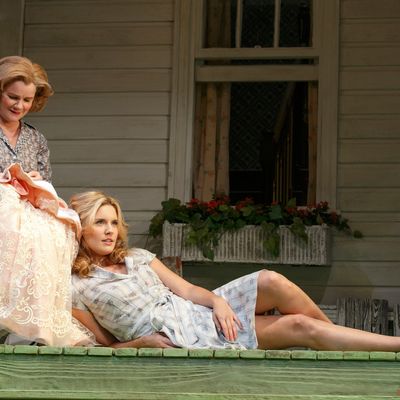
In the plays of William Inge, the old tend to vampirize the succulent young, sometimes vindictively, sometimes innocently, protectively, and with the best of intentions. Director Sam Gold, in his second Broadway outing, is looking to pull off a reversal: He wants to revivify Inge, a playwright once in the running for that elusive “American Chekhov” horseshoe wreath, but whose fifties photo albums of small-town agonists (Bus Stop; Come Back, Little Sheba; the screenplay for Splendor in the Grass) now languish, not quite fairly, in the midcentury curio bin next to Peyton Place and the melodramas of Douglas Sirk. Inge’s metier was repression, his drug of choice (after alcohol) was therapy, and, unlike his great rival, Tennessee Williams, he didn’t flirt with camp or irony: In an Inge play, when a drifter beefcake comes to town and shakes up the locals with his untamed carnality, he comes raw, stripped of everything, even his quotation marks. Inge, forerunner of Lanford Wilson and Horton Foote, was a Midwestern humanist with piercing sympathy for his characters—so isn’t that basic sincerity excavable from beneath all the Freudian chintz and straining angora? Especially if the excavator is someone like Gold, a talented young standard-bearer of the post-irony movement? The answer is complicated—but certainly not a solid yes.
Gold—who, last year, skillfully unleashed the fun inside Theresa Rebeck’s Seminar while tamping down its mopey, hokey dilettantism—has taken on Picnic, Inge’s ’53 Pulitzer Prize winner. It’s probably the playwright’s most recognizable work, thanks to the prize and the film version, which starred a comically age-inappropriate William Holden. The catalyst is a handsome, volatile stranger who hits a small Kansas town like a comet on the day of its annual carnival, the Neewollah Picnic. “Neewollah” is Halloween backwards, and Inge meant Picnic as a sort of mild witch’s sabbath, where forces of sex, loneliness, and disappointment, held at bay by propriety, suddenly flare, upending lives of quiet desperation. Gold has applied his trademark invisible grace: letting pertinent silences bloom in the empty space between lines, trusting his actors implicitly, rejecting affectation, letting a variety of approaches and styles coalesce in an atmosphere of honesty. In the language of Instagram, Gold wants to do Picnic with #nofilter. But the play, I think, might demand one—and actors, naturally, start generating their own when none is prescribed.
The result is a small town where everybody’s from somewhere else. Nothing feels local, there’s no center of gravity, and the very things I think Gold is trying to avoid—a generic “fifties” vibe, for example—start to fill the void, unbidden. So our stymied homecoming queen Madge (Lost’s Maggie Grace) may be a fine study in sexual and spiritual restlessness, but she comes from a more realistic universe than her forbidden lover, the hunky lost-soul Hal Carter (Captain America’s Sebastian Stan). Ellen Burstyn is a delightful Mrs. Potts, the libidinous biddy next door, but she’s ever-so-slightly at odds with the deep detail in Mare Winningham’s Flo, Madge’s controlling mother, who can’t bear to watch her daughter repeat her mistakes. And then there’s Elizabeth Marvel, her high-beams a-blazin’ as Rosemary, Flo’s boarder, an “old-maid schoolteacher,” vengeful prig and champion hypocrite: Her part is written big and played even bigger.
That’s a lot of traffic, stylistically, and performances that don’t match seem not to collide so much as move through each other, like ghosts. That’s not to say the energies never align. Gold, draining the light from the stage as the day wanes, gives us moments of excellent pandemonium. Winningham, in particular, is effective as a woman who’s internalized a lifetime of disappointments, and her presence has a steadying effect. And when Reed Birney, a Gold favorite from Off Broadway, takes the stage as Howard, Rosemary’s boyfriend, everything seems to snap into alignment. Birney has become known as a master of graying sad sacks, but his Howard—an aging, harmless libertine—has a dampening effect that gives Marvel something to push against: Their tormented courtship culminates in a wedding proposal from hell, and it’s the emotional high point of the evening.
Less sustainable is play’s operative romance between Madge and Hal. Grace and Stan are both fine stage performers, and when kept at a distance, there’s a charge crackling in the sultry Kansas air. But that electricity turns static as soon as they collide. Hal, in particular, is a tall order for any actor (or any director) at this late, jaded date: This is, let’s not forget, a play whose plot turns on a torn shirt and a flexed chest. When Stan enters, abs-first, in his natural state—i.e. oiled and varnished like refurbished Stickley—the distinct musk of camp is hard to ignore, and giggles ripple through the audience as dangerously unacknowledged comic energies spurt up in sudden plumes. There are moments so fulsome, you expect John Waters to descend from the flies and whisk Stan away in a go-go cage. This, too, is Inge, and Gold, a team player and truster-of-material, gives in where he must. I wish there’d been a bit more of a game-plan here, even if it meant risking affectations and impositions—perhaps even a soupcon of condescension might’ve been in order. As it stands, this Picnic is an ad hoc smorgasbord, where not all dishes are guaranteed to palate in perfect harmony. Not everything goes down smoothly, and one wonders if a bit more salt might’ve tied the whole thing together.
Picnic is at the Roundabout Theatre Company’s American Airlines Theatre through February 24.

